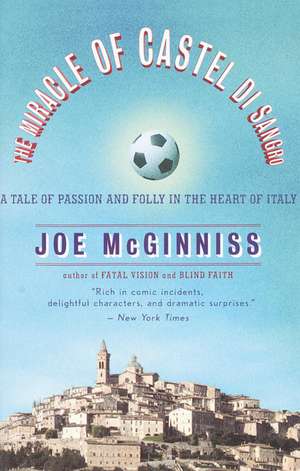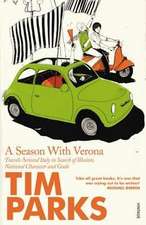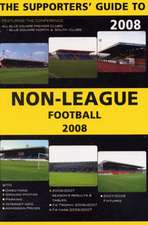The Miracle of Castel Di Sangro: A Tale of Passion and Folly in the Heart of Italy
Autor Joe Jr. McGinnissen Limba Engleză Paperback – 31 mai 2000
When Joe McGinniss sets out for the remote Italian village of Castel di Sangro one summer, he merely intends to spend a season with the village's soccer team, which only weeks before had, miraculously, reached the second-highest-ranking professional league in the land. But soon he finds himself embroiled with an absurd yet irresistible cast of characters, including the team's owner, described by the New York Times as "straight out of a Mario Puzo novel," and coach Osvaldo Jaconi, whose only English word is the one he uses to describe himself: "bulldozer."
As the riotous, edge-of-your-seat season unfolds, McGinniss develops a deepening bond with the team, their village and its people, and their country. Traveling with the miracle team, from the isolated mountain region where Castel di Sangro is located to gritty towns as well as grand cities, McGinniss introduces us to an Italy that no tourist guidebook has ever described, and comes away with a "sad, funny, desolating, and inspiring story--everything, in fact, a story should be" (Los Angeles Times).
Preț: 95.25 lei
Nou
18.23€ • 19.03$ • 15.08£
Carte disponibilă
Livrare economică 14-28 martie
Specificații
ISBN-10: 0767905997
Pagini: 416
Dimensiuni: 132 x 203 x 20 mm
Greutate: 0.43 kg
Editura: BROADWAY BOOKS
Recenzii
--New York Times
"What McGinniss recounts in this wonderful memoir is the stuff of Italian opera--passion, buffoonery, courage, treachery, and tragedy."
--Dallas Morning News
"Soccer acts as a lens through which the author sees the real Italy, the medium-sized industrial towns where people live and work, away from the tourist's gaze. McGinniss went looking for a soccer team and found lives filled with humor and tragedy."
--The Wall Street Journal
"A classic of cultures colliding."
--The Independent
Extras
As I've promised, I take you the details of your arrive. It is not easy to go from Rome to Castel di Sangro: we are in a montain zone (800 m on sea level; much than 200 km from Rome) and you'll take the train to arrive.
If you are at 7:35 a.m. on Fiumicino Airport in Rome, you'll be able to take a taxi to go to Termini Railway Station to take the 11:50 train from Rome to SULMONA. The arrive is on 15:06 p.m. Sulmona is at 150 km from Castel di Sangro and I'll be at Sulmona station. Excuse me, but I'm very busy in this days before the first match of the championship for some manifestation about Castel di Sangro and it is very impossible for me to be at Rome as I want. . . . But we are mointain people and, don't worry, we are used to combact against difficulties. As Lilliput people in a Gigant World.
So Giuseppe would not meet my plane after all. I flew to Rome anyway, of course. But as soon as I wheeled my luggage cart through customs, and the horde of cab drivers descended upon me, I picked the first one.
"How much to Sulmona?"
"Five 'undred thousand."
"Four," I said.
He motioned with his thumb. "Follow me." And so I was off to the Abruzzo, well in advance of the 11:50 from Rome. Italy is composed of twenty regions. Some are legendary, others extremely popular with foreign tourists, and still more, though not as well known to outsiders, prized by the Italians themselves. And then there is the Abruzzo.
Frommer's 1996 guide to Italy describes it as "one of the poorest and least visited regions" in the country. "Arid and sunscorched . . . prone to frequent earthquakes, the Abruzzo is . . . impoverished and visually stark." It is a region, says another guidebook, "in which there is little of interest to see and even less to do."
This reputation was not acquired overnight. Nathaniel Hawthorne visited in the nineteenth century and wrote even then that the region was "without enough of life and juiciness to be any longer susceptible of decay. An earthquake would afford it the only chance of ruin, beyond its present ruin."
And that was in season. The English poet Swinburne, for reasons never adequately explained, attempted to penetrate the Abruzzo's mountainous defenses in the winter of 1879 but was driven back by "as outrageous a blast of snow as any I've ever faced." He returned to Rome and did not try again.
As for the inhabitants, the English travel essayist Norman Douglas wrote in the early years of this century that "their life is one of miserable, revolting destitution." And Frommer's pointed out more recently that "many of its people have emigrated to more prosperous regions," leaving behind only "clannish local families," described in another book as "atavistic and introspective."
"This is still a land," author Tim Jepson has written, "that could provide settings for a dozen fairy tales, with its wolves and bears and sturdy country folk. . . . Villages on snow-dusted hills are wreathed in mist amid the wild mountains, deep valleys and dark forests; and ancient are crafts practiced for their own uses, not for the tourists."
But I was no tourist. For better or worse, I had business in the Abruzzo. My destination was the remote town of Castel di Sangro, which some contend means "castle of blood" in the local dialect.
The town is shielded from outsiders by what one reference book describes as an "inaccessibility extreme even by the standards of the Abruzzo." It is located almost 3,000 feet above sea level. Winter lasts from October to May, and in all seasons bestial winds gust down upon it from higher mountains above.
On one side, Castel di Sangro is bordered by the Abruzzo National Park, which still contains wolves and brown bears, as well as more than thirty species of reptile. On the other side lies the immense and silent Valle della Femmina Morta, or "valley of the dead woman." Strangers to the region who ask how such a name came to attach itself to such a vast and empty expanse reportedly receive only shrugs or the shaking of heads in response.
Beyond the valley rises La Maiella, an enormous limestone massif cut by deep and treacherous canyons and containing more than fifty peaks, the highest of which, Monte Amaro, or "the bitter mountain," reaches an altitude of almost 10,000 feet. Again, the origin of the name has been lost in the mists of time and legend.
"This is a landscape," warns yet another guidebook, "that should be approached with caution." Or, in the alternative, not approached at all. Yet so deep in the grip of mania was I that I was not only approaching but preparing to plunge into its core: alone, knowing no one, speaking not a word of Italian, yet committed to staying for more than nine months.
My arrival came on a warm Saturday in early September of 1996. The driver dropped me at the deserted Sulmona train station just before noon. All seemed tranquil and pleasant. Leaving my mass of luggage in the somewhat drowsy custody of a ticket agent, I walked a few hundred yards into the center of the city (population: 25,000), ate a moderate lunch, and returned to the station. I napped intermittently for an hour or two, lying on the platform next to the tracks, my head resting on a duffel bag and dappled sunlight falling on me through late-summer leaves.
In midafternoon I heard a train whistle in the distance. My train! The 11:50 from Rome. I looked at my watch: 3 p.m. Right on time. Leaving my luggage again, I walked to the front of the station, looking for someone who might be Giuseppe, hoping that some new "manifestation" had not prevented him from coming to Sulmona.
Just then, a small, battered automobile entered the parking lot at high speed and jerked to a halt. Out bounded a man who appeared to be in his mid-twenties, with dark hair and an alert look in his eyes.
"Giuseppe?" I called.
Textul de pe ultima copertă
When Joe McGinniss sets out for the remote Italian village of Castel di Sangro in the summer of 1996, he merely wants to spend a season with the village's soccer team, which only weeks before had, miraculously, reached the second-highest-ranking professional league in the land. But soon he finds himself embroiled with an absurd yet irresistible cast of characters, including the team's owner, described by the New York Times as "straight out of a Mario Puzo novel, smoking huge cigars and trailed by bodyguards", and coach Osvaldo Jaconi, whose only English word is the one he uses to describe himself: "bulldozer".
As the riotous, edge-of-your-seat season unfolds, so, too, does McGinniss's transformation into a true Italian soccer fan, complete with the irrational and blinding passions for which such fans are known. Moreover his fervor for soccer intertwines and grows with his love for the courageous team, their village and its people, and their country. As McGinniss travels with the miracle team on the season-long tour that takes him from the isolated mountain region where Castel di Sangro is located to such gritty towns as Foggia and Cosenza, as well as to obscure nooks of such grand cities as Genoa, Venice, and Verona, he introduces us to an Italy that no tourist guidebook has ever described. The Miracle of Castel di Sangro is a spellbinding, true story of an Italy to savor.










